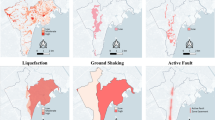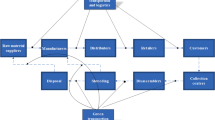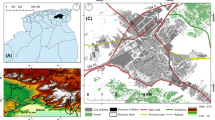Abstract
A robust and scientific selection of appropriate Travel Demand Management (TDM) measures is likely to ensure that the purpose of their implementation is met. The existing methods of TDM measure selection do not often adopt a multi-dimensional approach in their decision-making process. Besides, there is minimal scholarly work on the selection of a ‘push plus pull’ integrated TDM package, even though it has been emphasized in the published literature. These gaps are addressed in our study, which adopts a novel approach of a Multi-Criteria Decision Making (MCDM) methodology. A combination of ‘Decision Making Trial and Evaluation Laboratory’ (DEMATEL) and ‘Analytical Network Process‘(ANP), along with the VIKOR, which is a ranking method used to select a suitable TDM package, a priori. The demonstration of the proposed methodology is presented for the case study area of Ahmedabad’s old city, which is located in the western state of Gujarat in India. A total of six TDM packages were initially shortlisted as probable contenders for the study area, each package consisting of one coercive (push) and one attracting (pull) measure. The MCDM tool ‘VIKOR’ was used to derive the ranking of these packages based on their performance in seven different criteria. The DEMATEL based ANP method was used to determine the weights of these criteria by comparing the influence of criteria over each other. The uncertainty and subjectivity involved in the entire process was taken into account by employing fuzzy logic into our proposed methodology. The research contribution of the study is a methodological framework that can assist policymakers in the a priori selection of a TDM package. The outputs from the study are twofold—(a) the Influence Network Relationship Map (INRM) and (b) the ranking of the TDM packages for the case study area. The INRM explains the relations between dimensions as well as between criteria within each dimension. Additionally, it classifies the dimension and criteria into cause and effect groups, which can help policymakers in developing a better understanding of the TDM implementation process. In our case study, the TDM package of congestion pricing and public bike sharing was the top ranked package. The most influential dimension was political feasibility, followed by private participation and public acceptability. In addition, effectiveness, investment attractiveness, and system resistance were the most influencing criteria within their respective dimensions.







Similar content being viewed by others
References
Agarwal, A., Shankar, R., Tiwari, M.K.: Modeling the metrics of lean, agile and leagile supply chain: an ANP-based approach. Eur. J. Oper. Res. 173(1), 211–225 (2006). https://doi.org/10.1016/j.ejor.2004.12.005
Australian Transport Council.: National Guidelines for Transport System Management in Australia: Appraisal of initiatives (2006)
Azari, K.A., Arintono, S., Hamid, H., Davoodi, S.R.: Evaluation of demand for different trip purposes under various congestion pricing scenarios. J. Transp. Geogr. 29, 43–51 (2013). https://doi.org/10.1016/j.jtrangeo.2013.01.001
Bristow, A.L., Nellthorp, J.: Transport project appraisal in the European Union. Transp. Policy 7(4), 237–248 (2000). https://doi.org/10.1080/02688867.1992.9726873
Browne, D., Ryan, L.: Comparative analysis of evaluation techniques for transport policies. Environ. Impact Assess. Rev. 31(3), 226–233 (2011). https://doi.org/10.1016/j.eiar.2010.11.001
Büyüközkan, G., Çifçi, G.: A novel fuzzy multi-criteria decision framework for sustainable supplier selection with incomplete information. Comput. Ind. 62(2), 164–174 (2011). https://doi.org/10.1016/j.compind.2010.10.009
Camargo Pérez, J., Carrillo, M.H., Montoya-Torres, J.R.: Multi-criteria approaches for urban passenger transport systems: a literature review. Ann. Oper. Res. 226(1), 69–87 (2014). https://doi.org/10.1007/s10479-014-1681-8
Chang, B., Chang, C.W., Wu, C.H.: Fuzzy DEMATEL method for developing supplier selection criteria. Expert Syst. Appl. 38(3), 1850–1858 (2011). https://doi.org/10.1016/j.eswa.2010.07.114
Chen, F.H., Hsu, T.S., Tzeng, G.H.: A balanced scorecard approach to establish a performance evaluation and relationship model for hot spring hotels based on a hybrid MCDM model combining DEMATEL and ANP. Int. J. Hospitality Manag. 30(4), 908–932 (2011). https://doi.org/10.1016/j.ijhm.2011.02.001
Chiu, W.Y., Tzeng, G.H., Li, H.L.: A new hybrid MCDM model combining DANP with VIKOR to improve e-store business. Knowl.-Based Syst. 37, 48–61 (2013). https://doi.org/10.1016/j.knosys.2012.06.017
DMRC.: DPR: Ahmedabad metro rail project (Phase 1) (2015)
Eddington, R.: The Eddington Transport Study. Main Report: Transport’s Role in Sustaining the UK’s Productivity and Competitiveness (2006)
EPOMM consortium: European planning on mobility management (2014). http://www.epomm.eu/. Accessed 6 Aug 2018
Eriksson, L., Garvill, J., Nordlund, A.M.: Acceptability of single and combined transport policy measures: the importance of environmental and policy specific beliefs. Transp. Res. Part A: Policy Pract. 42(8), 1117–1128 (2008). https://doi.org/10.1016/j.tra.2008.03.006
Freimer, M., Yu, P.L.: Some new results on compromise solutions for group decision problems. Manag. Sci. 22(6), 688–693 (1976). https://doi.org/10.1287/mnsc.22.6.688
Gabus, A., Fontela, E.: World problems, an invitation to further thought within the framework of DEMATEL, pp. 1–8. Battelle Geneva Research Center, Geneva, Switzerland (1972)
Garling, T., Schuitema, G.: Travel demand management targeting reduced private car use: effectiveness, public acceptability and political feasibility. J. Soc. Issues 63(1), 139–153 (2007). https://doi.org/10.1111/j.1540-4560.2007.00500.x
Gärling, T., Loukopoulos, P.: Effectiveness, public acceptance and political feasibility of coercive measures for reducing car traffic. In: Threats from car traffic to the quality of urban life, p. 487 (2007). https://doi.org/10.1108/9780080481449
GIDB: Bus Rapid Transit System Ahmedabad—Final Report (2005)
Giuliano, G.: The changing landscape of transportation decision making. Transp. Res. Rec. 2036, 5–12 (2007). https://doi.org/10.3141/2036-01
Gupta, S.: Understanding accessibility in walled city A case study of Ahmedabad (2016). Retrieved from http://hdl.handle.net/20.500.12725/352
Habibian, M., Kermanshah, M.: Exploring the role of transportation demand management policies’ interactions. Sci. Iran. 18(5), 1037–1044 (2011). https://doi.org/10.1016/j.scient.2011.09.005
Hensher, D.A., Puckett, S.M.: Congestion and variable user charging as an effective travel demand management instrument. Transp. Res. Part A: Policy Pract. 41(7), 615–626 (2007). https://doi.org/10.1016/j.tra.2006.07.002
Hwang, C.-L., Yoon, K.: Multiple Attribute Decision Making (1981). https://doi.org/10.1007/978-3-642-48318-9
Kavta, K., Goswami, A.: Traffic Congestion Mitigation: A Research Review of Supply and Demand Approaches (No. 18-04383) (2018)
Kelly, C., May, A., Jopson, A.: The development of an option generation tool to identify potential transport polivy packages. Transp. Policy (2008). https://doi.org/10.1016/j.tranpol.2008.12.008
King, D., Manville, M., Shoup, D.: The political calculus of congestion pricing. Transp. Policy 14(2), 111–123 (2007). https://doi.org/10.1016/j.tranpol.2006.11.002
Kochan, B., Bellemans, T., Janssens, D., Wets, G.: Assessing the impact of fuel cost on traffic demand in Flanders using activity-based models. TDM, Vienna, Austria (2008)
Konsult.: (n.d.) http://www.konsult.leeds.ac.uk/. Accessed 25 May 2018
Koryagin, M.: Urban planning: a game theory application for the travel demand management. Period. Polytech. Transp. Eng. 46(4), 171–178 (2018). https://doi.org/10.3311/PPtr.9410
Kuo, S., Chang, K., Chen, S.: Decision-making on transport policy: a comparison between scholars and stakeholders. J. East. Asia Soc. Transp. Stud. 10, 335–349 (2013)
Liou, J.J.H., Tzeng, G.-H., Chang, H.-C.: Airline safety measurement using a hybrid model. J. Air Transp. Manag. 13(4), 243–249 (2007). https://doi.org/10.1016/j.jairtraman.2007.04.008
Litman, T.: The online TDM encyclopedia: mobility management information gateway. Transp. Policy 10, 245–249 (2003). https://doi.org/10.1016/S0967-070X(03)00025-8
Liu, C.H., Tzeng, G.H., Lee, M.H.: Improving tourism policy implementation—the use of hybrid MCDM models. Tour. Manag. 33(2), 413–426 (2012). https://doi.org/10.1016/j.tourman.2011.05.002
Liu, C.H., Tzeng, G.H., Lee, M.H., Lee, P.Y.: Improving metro-airport connection service for tourism development: using hybrid MCDM models. Tour. Manag. Perspect. 6, 95–107 (2013). https://doi.org/10.1016/j.tmp.2012.09.004
Liu, H.-C., You, J.-X., Zhen, L., Fan, X.-J.: A novel hybrid multiple criteria decision making model for material selection with target-based criteria. Mater. Des. 60, 380–390 (2014). https://doi.org/10.1016/j.matdes.2014.03.071
Lu, M.T., Lin, S.W., Tzeng, G.H.: Improving RFID adoption in Taiwan’s healthcare industry based on a DEMATEL technique with a hybrid MCDM model. Decis. Support Syst. 56(1), 259–269 (2013). https://doi.org/10.1016/j.dss.2013.06.006
Ma, F., Shi, W., Yuen, K.F., Sun, Q., Guo, Y.: Multi-stakeholders’ assessment of bike sharing service quality based on DEMATEL–VIKOR method. Int. J. Logist. Res. Appl. (2019). https://doi.org/10.1080/13675567.2019.1568401
Macharis, C., Bernardini, A.: Reviewing the use of multi-criteria decision analysis for the evaluation of transport projects: time for a multi-actor approach. Transp. Policy 37, 177–186 (2015). https://doi.org/10.1016/j.tranpol.2014.11.002
Mardani, A., Jusoh, A., Nor, K.M.D., Khalifah, Z., Zakwan, N., Valipour, A.: Multiple criteria decision-making techniques and their applications—A review of the literature from 2000 to 2014. Economic Research-Ekonomska Istrazivanja 28(1), 516–571 (2015). https://doi.org/10.1080/1331677X.2015.1075139
Mardani, A., Zavadskas, E.K., Khalifah, Z., Jusoh, A., Nor, K.M.: Multiple criteria decision-making techniques in transportation systems: a systematic review of the state of the art literature. Transport 31(3), 359–385 (2016). https://doi.org/10.3846/16484142.2015.1121517
Martens, K.: Promoting bike-and-ride: the Dutch experience. Transp. Res. Part A: Policy Pract. 41(4), 326–338 (2007). https://doi.org/10.1016/j.tra.2006.09.010
Meyer, M.D.: Demand management as an element of transportation policy: using carrots and sticks to influence travel behavior. Transp. Res. Part A: Policy Pract. 33(7–8), 575–599 (1999). https://doi.org/10.1016/S0965-8564(99)00008-7
Nourinejad, M., Roorda, M.J.: Impact of hourly parking pricing on travel demand. Transp. Res. Part A: Policy Pract. 98, 28–45 (2017). https://doi.org/10.1016/j.tra.2017.01.023
Nozick, L.K., Borderas, H., Meyburg, A.H.: Evaluation of travel demand measures and programs: a data envelopment analysis approach. Transportation Research Part A: Policy and Practice 32(5), 331–343 (1998). https://doi.org/10.1016/S0965-8564(97)00043-8
Opricovic, S.: Multicriteria optimization of civil engineering systems. Fac. Civ. Eng. Belg. 2(1), 5–21 (1998)
Opricovic, S., Tzeng, G.: Defuzzification Within a Multicriteria Decision Model. Int. J. Uncertain. Fuzziness Knowl.-Based Syst. 11(05), 635–652 (2003). https://doi.org/10.1142/S0218488503002387
Opricovic, S., Tzeng, G.H.: Compromise solution by MCDM methods: a comparative analysis of VIKOR and TOPSIS. Eur. J. Oper. Res. 156(2), 445–455 (2004). https://doi.org/10.1016/S0377-2217(03)00020-1
Peder, J., Marshall, S., Kristensen, J.P., Marshall, S.: Mobility management to reduce travel: the case of Aalborg. Built Environ. 25(2), 138–150 (1999)
Pendyala, R., Kitamura, R., Chen, C., Pas, E.: An activity-based microsimulation analysis of transport control measures. Transp. Policy 4(3), 183–192 (1997)
Peng, K.-H., Tzeng, G.-H.: A hybrid dynamic MADM model for problem-improvement in economics and business. Technol. Econ. Dev. Econ. 19(4), 638–660 (2013). https://doi.org/10.3846/20294913.2013.837114
Percoco, M.: Quality of institutions and private participation in transport infrastructure investment: evidence from developing countries. Transp. Res. Part A: Policy Pract. 70, 50–58 (2014). https://doi.org/10.1016/j.tra.2014.10.004
Ranjan, R., Chatterjee, P., Chakraborty, S.: Performance evaluation of Indian Railway zones using DEMATEL and VIKOR methods. Benchmarking 23(1), 78–95 (2016). https://doi.org/10.1108/BIJ-09-2014-0088
Rose, G: Appraisal and evaluation of travel demand management measures. In: 30th Australasian Transport Research Forum, pp. 1–18 (2007)
Roumboutsos, A., Pantelias, A.: Allocating Revenue Risk in Transport Infrastructure Public Private Partnership Projects: how it Matters. Transp. Rev. 35(2), 183–203 (2015). https://doi.org/10.1080/01441647.2014.988306
Saaty, T.L.: How to make a decision: the analytic hierarchy process. Eur. J. Oper. Res. 48(1), 9–26 (1990)
Soltani, A., Allan, A.: Feasibility analysis of transport demand management policies through a bottomup planning approach. Int. J. Adv. Appl. Sci. 1(2), 71–76 (2012)
Song, G., Yu, L., Zhang, Y.: Applicability of traffic microsimulation models in vehicle emissions estimates. Transp. Res. Rec. 2270, 132–141 (2012). https://doi.org/10.3141/2270-16
Steg, L., Vlek, C.: The role of problem awareness in willingness-to-change car use and in evaluating relevant policy measures. In: Traffic and Transport Psychology. Theory and Application (1997)
Suthar, N.: Study of Mode Choice Behaviour for Public Transportation. CEPT University, Ahmedabad (2017)
Swamy, S., Baindur, D.: Managing urban logistics in an expanding city—case study of Ahmedabad. World Conf. Transp. Res. 380009, 1–21 (2013)
Tadić, S., Zečević, S., Krstić, M.: A novel hybrid MCDM model based on fuzzy DEMATEL, fuzzy ANP and fuzzy VIKOR for city logistics concept selection. Expert Syst. Appl. 41(18), 8112–8128 (2014). https://doi.org/10.1016/j.eswa.2014.07.021
Taylor, C., Nozick, L., Meyburg, A.: Selection and Evaluation of Travel Demand Management Measures. Transp. Res. Rec. J. Transp. Res. Board 1598(971114), 49–60 (1997). https://doi.org/10.3141/1598-08
Tiwari, G.: Urban transport priorities. Cities 19(2), 95–103 (2002). https://doi.org/10.1016/S0264-2751(02)00004-5
Tsai, W.H., Chou, W.C., Leu, J.Der: An effectiveness evaluation model for the web-based marketing of the airline industry. Expert Syst. Appl. 38(12), 15499–15516 (2011). https://doi.org/10.1016/j.eswa.2011.06.009
Tzeng, G.-H., Huang, J.-J.: Multi Attribute Decision Making. Taylor & Francis, London (2011)
Ubbels, B., Verhoef, E.: Barriers to transport pricing. In: Barriers to Sustainable Transport: Institutions, Regulation and Sustainability (2005)
Wang, T.C.: The interactive trade decision-making research: an application case of novel hybrid MCDM model. Econ. Model. 29(3), 926–935 (2012). https://doi.org/10.1016/j.econmod.2012.02.001
Wang, Y.L., Tzeng, G.H., Lee, W.S.: Key success factors of brand marketing for creating the brand value based on a MCDM model combining DEMATEL with ANP methods. Smart Innov. Syst. Technol. 4(5), 721–730 (2010). https://doi.org/10.1007/978-3-642-14616-9_70
Winters, P.L., Lee, C., Hillsman, E.L., Georggi, N.L.: Developing a Technique that Predicts the Impacts of TDM on a Transportation System (2010)
Wu, W.W., Lee, Y.T.: Developing global managers’ competencies using the fuzzy DEMATEL method. Expert Syst. Appl. 32(2), 499–507 (2007). https://doi.org/10.1016/j.eswa.2005.12.005
Yu, P.L.: A class of solutions for group decision problems. Manage. Sci. 19(8), 936–946 (1973). https://doi.org/10.1287/mnsc.19.8.936
Yuan, J.F., Skibniewski, M.J., Li, Q., Shan, J.: The driving factors of China’s public-private partnership projects in metropolitian transportation systems: public sector’s viewpoint. J. Civ. Eng. Manag. 16(1), 5–18 (2010). https://doi.org/10.3846/jcem.2010.01
Zadeh, L.A.: Fuzzy sets. Inf. Control 353, 338–353 (1965)
Funding
This research received no specific grant from any funding agency.
Author information
Authors and Affiliations
Contributions
Author KK designed and conducted the expert interviews, analyzed the data, and wrote the paper. Author Dr. AG supervised the research, gave critical inputs at different stages, and co-authored the paper.
Corresponding author
Ethics declarations
Conflict of interest
On behalf of all authors, the corresponding author states that there is no conflict of interest.
Additional information
Publisher's Note
Springer Nature remains neutral with regard to jurisdictional claims in published maps and institutional affiliations.
Rights and permissions
About this article
Cite this article
Kavta, K., Goswami, A.K. A methodological framework for a priori selection of travel demand management package using fuzzy MCDM methods. Transportation 48, 3059–3084 (2021). https://doi.org/10.1007/s11116-020-10158-0
Published:
Issue Date:
DOI: https://doi.org/10.1007/s11116-020-10158-0




